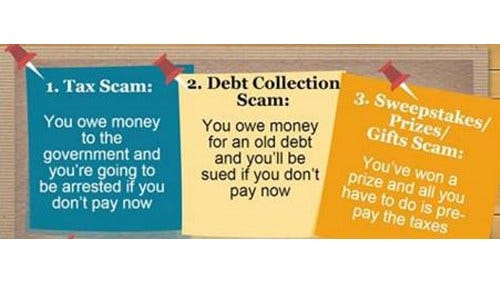BBB Lists Top Ten Scams of 2015

Subscriber Benefit
As a subscriber you can listen to articles at work, in the car, or while you work out. Subscribe NowThe Better Business Bureau has released its list of top ten scams of 2015. Out of the first 10,000 scam reports found by the BBB’s Scam Tracker, which launched earlier this year, 24 percent of the reports were tax scams.
Nearly 2,400 reports were about imposters pretending to be from the Internal Revenue Service. Fifty reports were about imposters from the Canadian Revenue Agency as well.
The BBB says while 85 percent of the people reporting the scams recognized them as frauds before any money was stolen, the top ten scams still accounted for $1 million lost. The rest of the top ten scams were all some form of imposter scam. The full list of top ten scams includes the following:
Indianapolis – December 26, 2015 When Better Business Bureau launched BBB Scam Tracker earlier this year, it was expected that tax scams would be high on the list. What was surprising was how high; more than the next three categories put together. In the first 10,000 scam reports processed by BBB, a whopping 24% were about imposters pretending to be either the Internal Revenue Service (2,363 reports) or the Canadian Revenue Agency (50 reports).
The rest of the top ten were all some form of imposter scam: debt collection scam, sweepstakes scam, tech support scam, government grant scam, etc. About 85% of those reporting scams to BBB recognized them as frauds before any money was stolen, but the Top Ten Scams still account for more than $1 million dollars lost from those who filed with BBB.
- Tax Scams (24%)
- Debt Collections (8.3%)
- Sweepstakes/Prizes/Gifts (8%)
- Tech Support (6%)
- Government Grant (5.7%)
- Advanced Fee Loan (3.8%)
- Credit Cards (3%)
- Work from Home (2.6%)
- Fake Check/Money Order (2.4%)
- Lottery (2.4%)
“Scammers are all basically imposters,” said Mary E. Power, president and CEO of the Council of Better Business Bureaus. “Three of the top four scams reported to us are those that scare people with threats of arrest, law suits or other frightening actions. Scammers are pretending to be government agents, lawyers, debt collectors, police officers. They engage directly with you, so your best bet to avoid being scammed is to stop engaging. Hang up the phone, delete the email, shut the door.”
The BBB says you should never provide personal information to people you do not know. If you are unsure about a call or email that claims to be from a legitimate company, call the business directly to clarify any issues.
You can find more information by the BBB’s Scam Stopper program by clicking here.
